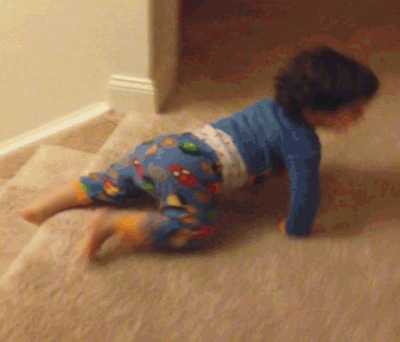Career paths of the past: Smooth sailing
As little as a decade ago, most people experienced relatively smooth career change. Maybe you started out in a support role such as program coordinator, then found a job as a program manager in a similar field, and finally reached a program director level in a related industry. Pretty smooth sailing, each step leading naturally and logically to the next.
There is a theory of child cognitive development developed by Jean Piaget and Bärbel Elisabeth Inhelder that parallels the experience many adults had in their careers until recently. Piaget observed that when young children figure out one aspect of their world—say, it’s fun to go down a slide—they apply that knowledge to new experiences they encounter. Piaget calls this process assimilation, because the new information is assimilated into the framework already learned. Like, if a kiddie slide is fun, going down a flight of steps backwards is super fun!
Wheee, this is epic!
Assimilation is a pretty stress-free process, because the child is confirming what they already learned while adding to their knowledge with similar experiences. The logical and predictable career ladder was relatively stress-free as well, because you could anticipate what came next in your career and get prepared to take the next logical step.
It’s a whole new world out there
Today’s job marketplace is different for many people, however. Professionals not only change roles frequently, they shift to entirely new industries, launch entrepreneurial ventures, or go back to school to learn something completely different.
Imagine a child who enjoyed the kiddie slide going down a water slide when they don’t know how to swim.
Piaget saw that the child’s experience in situations like this was very different. A child who encountered a new experience that contradicted earlier knowledge becomes confused, uncomfortable, and even frustrated. It’s a process Piaget called disequilibrium, and the sensation of being off balance is one that resonates with career development too.
In a career trajectory that has become quite common, a person who studied communications with a concentration in journalism might have expected to work as a newspaper reporter, only to find that the field of journalism has changed dramatically in the past decade. Hello, discomfort, frustration, and confusion - otherwise known as disequilibrium!
If you can’t assimilate, what then?
Here’s where Piaget’s theory can provide a helpful corollary. When young children are faced with disequilibrium and their assimilation strategies haven’t worked, they may show discomfort and anxiety for a while, but then they undergo a developmental leap: accommodation. They adapt their previous rules for interpreting the world in order to accommodate this new experience, expanding their understanding of the world as they learn. Kiddie slides and carpeted stairs are fun, water slides aren’t so fun. (At least not until this particular child learns to swim.)
Older children take this process a step further by manipulating the world in their mind, thinking abstractly. Called the formal operations stage of development, Bärbel Elisabeth Inhelder was critical to this component of the theory. She created research experiments to study the inductive reasoning that young people perform as they enter adolescence. Rather than slides and stairs, kids at this age must develop strategies to deal with concepts like power, privilege, and discrimination among other concepts.
The key aspect to Piaget’s theory I talk with clients about is this: just before accommodation, it feels yucky. It’s stressful and uncomfortable and everything you’ve learned so far seems to be useless. You’re confused and you don’t know which way to go. This state of disequilibrium is not a pleasant place to be. BUT this means that a leap of learning and change and intense development is about to occur! You are about to turn a corner and find a whole new world. It’s so exciting!
As the future of work continues to change at an accelerated pace, this experience will become more pronounced and the discomfort will be more frequent. We’ll spend more time in transition than ever.
Disequilibrium is becoming the new normal
So when you’re at a low point in your career trajectory, when you feel as if your past education and experiences didn’t prepare you for this wild new world of transforming industries or the unpredictable gig economy, think about how great it will be when you DO learn to swim and go down that water slide. You will have a whole new way of seeing your career on the other side of the disequilibrium. It’s going to be so awesome!
Contact me if you'd like to discuss your next step, navigate the stress of a career shift, or begin a career transition. I’d love to hear about your professional goals and learn how I might help you achieve them. Please sign up for my weekly emails to prepare for the next disequilibrium phase of your career as well!
To learn more about the work of Piaget and Inhelder, check out these links.
https://www.questia.com/library/94275163/the-psychology-of-the-child
https://www.apadivisions.org/division-35/about/heritage/barbel-inhelder-biography
I also want to distinguish the psychological concept of assimilation (a positive experience in child development) from the more common meaning of cultural assimilation, which is often an involuntary and unjust experience for minority groups. I wish the term Piaget used did not have a negative alternative meaning today, because the two concepts are quite different.




